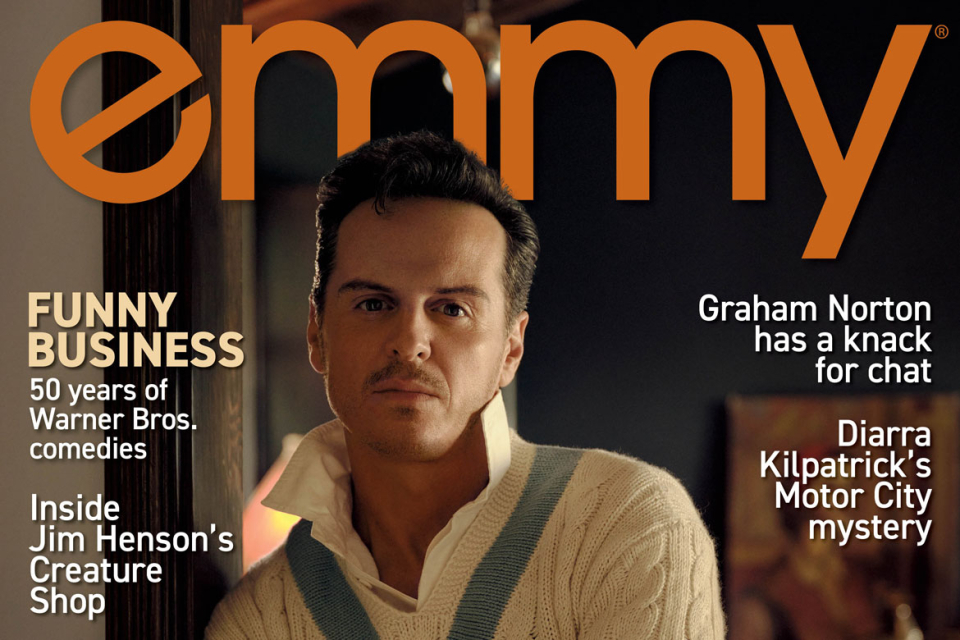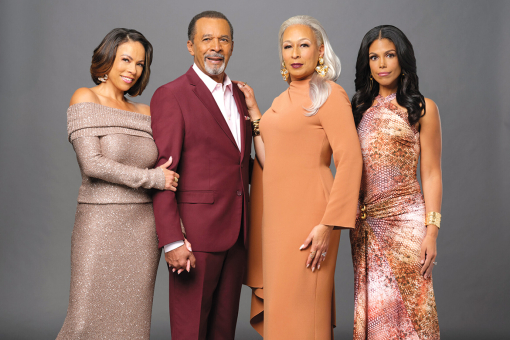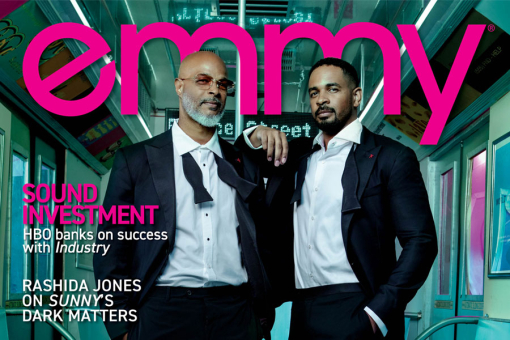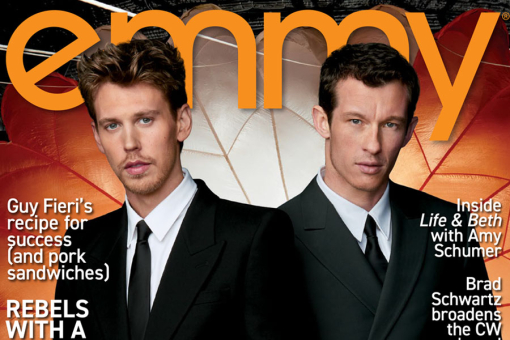Andrew Scott is redirecting the conversation.
The actor, who plays the enduring queer-with-a-question mark antihero Tom Ripley in the new Netflix series Ripley, has been doing just that in interviews as of late, and you can hardly blame him; he’s just coming off a promotional run for All of Us Strangers, a romantic fantasy film that has the real-life gay actor playing an adult gay man reliving his youth, including coming out. Scott — beloved as the “Hot Priest” from six-time Emmy winner Fleabag (Prime Video) and nominated in 2020 for an Outstanding Guest Actor turn in Netflix’s Black Mirror — got an avalanche of accolades for the film and, unsurprisingly, questions from reporters keen to link Scott and the character he plays. Interviews hint the Dublin-bred performer, who started acting as a kid and then matriculated through theater, may be weary with forays into identity politics, at least in relation to acting. He’s advised we retire “openly gay” as a descriptor and has likened the sometimes meandering “representation” discourse to a dead end. “It can be a cul-de-sac, certainly,” he told The Guardian. “I think transformation is as important as representation.”
He transforms in Ripley. This adaptation of Patricia Highsmith’s novels is a stylized, eight-episode noir thriller, with Scott as the titular, elusive con man. It’s true that people had a lot to say about The Talented Mr. Ripley’s queer-coded subtext almost as soon as Highsmith published it in 1955, with critics and essayists noting the homoeroticism oozing from Tom’s obsession with Dickie Greenleaf. Novelist Edmund White read Tom’s penchant for forgery as a metaphor for “passing,” as gays and lesbians of the era did to survive. Of course, cultural commentary and musings about identity have only intensified since, and that discourse nowadays can influence who gets cast and what gets made in the first place. Ripley is rendered in black and white, but black-and-white connections to Tom’s ambiguous sexual orientation, to his behavior or to Scott’s own interior life are, to this actor, the least interesting part of the story.
“I wanted to work very, very hard,” Scott tells emmy from Palm Springs, where he’s gone for a rest after sprinting through awards season. “And that involves just trying to imagine what it’s like to be this character, not play what people’s perception of what the character is. Tom has a very large brain. And watching the brain at work is what makes him such a fascinating character. Anything else, to me, is superfluous. I’m not sure he thinks about himself too much in that way.”
Watch the exclusive interview with Andrew Scott during the emmy cover shoot.
Scott was seduced by the writing. "The scripts were just so brilliantly economic and gripping," he says. "I thought it was a great opportunity to spend that amount of time with such a fascinating character." Steve Zaillian, who wrote, produced and directed Ripley, won an Oscar for his Schindler's List screenplay and received three Emmy nominations for HBO's The Night Of, which he cocreated, cowrote and directed, in part.
Set in the early 1960s, Ripley begins in New York and traverses a handful of Italian locales including the Amalfi Coast, Capri, Rome and Venice. Production ran from the summer of 2021 through the spring of 2022, including some of the pandemic’s most intense days, which forced cast and crew to adhere to stringent protocols. Yet the timing also meant that the citizens and tourists who ordinarily clog streets had vanished, allowing Ripley unobstructed views of Italy’s scenic vistas. As a result, Ripley has a strikingly stark feel that, combined with its blanched palette, conveys a chilly, quiet sparseness that affords full focus on Scott.
“Andrew’s transformation from a disreputable petty crook on the Lower East Side streets of New York to a sophisticated expatriate thriving in Italy is extraordinary,” Zaillian says. “Everything about him gradually changes — the way he looks and carries himself, how he behaves and speaks, how he thinks. It is a finely measured performance.”
Ripley follows Highsmith’s text almost to the letter. In the first episode, we meet Tom in the slums of New York City’s Lower East Side, where he ekes out a living by forging collection notices, stealing checks and committing petty grifts. You know the rest: Tom has a chance encounter with the wealthy father of a casual acquaintance, Dickie Greenleaf (Johnny Flynn, Genius: Einstein, Emma). Pretending to be an Ivy League grad and closer friend than he is, Tom is hired by Dickie’s dad to go to Italy and bring home Dickie, a trustafarian flitting about Europe with his girlfriend, Marge Sherwood (Dakota Fanning, The First Lady, The Alienist). Armed with a first-class ticket on an ocean liner and enough cash for six weeks, Tom finally tastes the affluence he’s always wanted, resented and believed he deserved but was never able to touch. He finds Dickie and develops an unhealthy obsession with him that eventually culminates in murder and identity theft.
It's the unsettling crime story where the bad guy not only wins but makes us complicit in his devious deeds. "What I think Patricia Highsmith does brilliantly," Scott says, "is make us root for somebody, even though they're doing something that we probably wouldn't do ourselves. He is constantly surviving. I can empathize with him, what that feels like, where he's just not being looked at. It's easy to say that someone is a monster because that moves us away from having to look at ourselves. Human beings do monstrous things to protect themselves. That's why that story has stuck around for so long."
Transforming into Tom Ripley took a toll. Even for a performer as versatile and energetic as Scott, who won a Best Supporting Actor BAFTA for playing Moriarty on Sherlock in 2012 and stunned audiences in 2023 by playing all eight parts in the Chekhov-inspired Vanya on the West End, Ripley demanded more than is typical. "What's unusual about this particular bit of television is how much time you spend with one character," he says. "A lot of the time in television, we can spend time with a hospital crew or a family or a police department, but it's unusual, I think, to spend so much time with one character over eight hours." He's in almost every frame. "I had to have an awful lot of stamina."
You really see that stamina in Ripley's fifth episode, a contained, tightly wound thriller unto itself. Scott is terrifying as he feigns innocence to Freddie Miles (Eliot Sumner), a friend of Dickie's who suspects foul play. We know Freddie is doomed the moment he enters Tom's elegant Rome apartment, but it's at the end of Freddie's visit that we see Scott's endurance tested as he lugs a heavy body and makes split-second decisions to elude attention, exuding a demented, friendly calm all the while. Scott — with minimal dialogue — slithers past whatever moral walls we believe separate us from monsters.
"You have to, through his face, be able to understand what he's feeling — sometimes in absolute silence," Scott says. "You have to be able to radiate a thought, which is quite difficult when you don't have language to support you. [The audience] is not thinking, 'I hope that inspector catches him.' No. You think, 'Oh my God, hurry up! Someone's coming!' That's extraordinary considering what he's just done. That feeling of, 'What would you do?' That's what the scripts have achieved."
To read the rest of the story, pick up a copy of emmy magazine here.
This article originally appeared in emmy magazine, issue #4, 2024.











